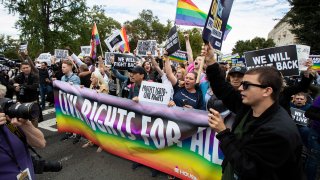
At least 32 transgender and gender-nonconforming people have been killed in the United States in 2022, the Human Rights Campaign announced Wednesday in its annual report ahead of the Transgender Day of Remembrance.
Transgender people of color account for 81% of known victims this year, and 59% were Black. Trans women are disproportionately represented, as they have been in years past, also comprising 81% of the deaths recorded at the time of publication.
WATCH ANYTIME FOR FREE
>Stream NBC10 Boston news for free, 24/7, wherever you are. |
The Human Rights Campaign has documented at least 302 violent deaths of transgender and gender-nonconforming people since the LGBTQ advocacy organization began tracking such fatalities in 2013 — the same year the FBI began tracking hate crimes against transgender people.
The victims have been “overwhelmingly Black, under 35 and killed with a firearm," the report states.
Get updates on what's happening in Boston to your inbox. Sign up for our >News Headlines newsletter.
Transgender Rights
Black transgender women, such as Shawmaynè Giselle Marie, a 27-year-old nursing assistant killed in June in Gulfport, Mississippi, comprise 63% of all recorded victims since 2013.
This week is Transgender Awareness Week and leads into Sunday's Transgender Day of Remembrance, an international observance honoring those killed by anti-transgender violence and drawing attention to the threats trans people face.
The Human Rights Campaign notes that the number of fatalities is likely an undercount because the deaths of trans people often go unreported or the victims are misgendered in news or police reports. The data does not encompass those who died by suicide, which has also been documented at significantly higher rates among LGBTQ people than in the general population.
The report found that 15 trans people have been killed by police or while incarcerated in jails, prisons or ICE detention centers since 2013, including two this year.
Other victims were killed by a person they knew. Since 2013, nearly one-fifth of those whose killer is known were killed by an intimate partner.
Among them is Ray Muscat, 26, who was fatally shot by his girlfriend in May in Michigan.
Fewer deaths have been reported than at the time of the publication of last year's report — 47. In 2021, the Human Rights Campaign recorded its highest total of fatal violence against trans and gender-nonconforming people, with 57 deaths by the year's end.
Shoshana Goldberg, public education and research director for the HRC Foundation, said this year's report comes amid the largest recorded wave of anti-trans legislation at the state level, which she said has largely been fueled by disinformation and stigma.
Some bills sought to limit discussion of LGBTQ topics in schools, restrict gender-affirming health care, and prevent transgender children from playing on sports teams or using bathrooms that align with their gender identities.
Such bills, she said, fuel anti-LGBTQ sentiment by painting queer and transgender people as a risk to children and communities.
States have enacted 25 anti-LGBTQ bills so far this year, including 17 directed at transgender people, according to the report. More than 145 anti-transgender bills have been introduced across 34 states, marking the largest number recorded by the Human Rights Campaign in a state legislative session.
Although the bills do not directly encourage violence against LGBTQ people, Goldberg said, they enforce a culture of bias that is often exacerbated by racism and sexism and can lead to an increased risk of fatal violence.
“This year saw unprecedented amounts of negative rhetoric and stigma aimed by anti-equality political leaders and public figures at transgender and nonbinary people, as well as their families, loved ones and even their medical providers," Goldberg said. “You can’t separate that from the horrific, ongoing violence against transgender people.”
An estimated 1.6 million people in the U.S. 13 and older identify as transgender, according to the Williams Institute, a think tank focused on LGBTQ issues at the University of California, Los Angeles.
___
Hannah Schoenbaum, based in Raleigh, North Carolina, is a corps member for the Associated Press/Report for America Statehouse News Initiative. Report for America is a nonprofit national service program that places journalists in local newsrooms to report on undercovered issues.



